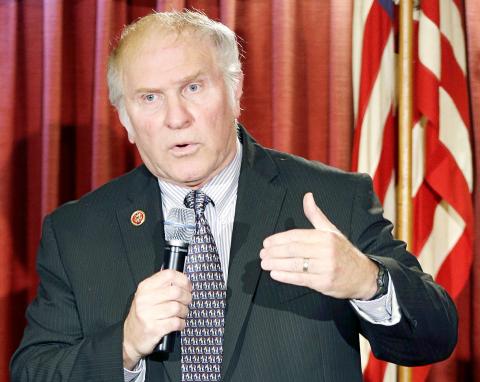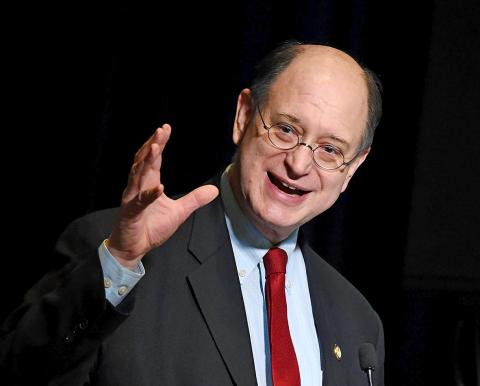Members of the US House of Representatives on Thursday introduced a draft Taiwan travel act that seeks to lift restrictions and allow all high-level officials of Taiwan, including the president, to visit Washington.
The bill, introduced by US representatives Steve Chabot, Brad Sherman and Ted Poe, states that “it should be the policy of the United States to encourage visits between the United States and Taiwan at all levels.”
“Over the past decades, United States-Taiwan relations have suffered from a lack of communication due to the self-imposed restrictions that the United States maintains on high-level visits with Taiwan,” the text of the bill says.

Photo: AP
The proposal advocates a policy of allowing all high-level Taiwanese officials to enter Washington or US embassies and consulates under conditions that demonstrate respect for such leaders.
The US should also allow high-level Taiwanese and US officials to meet in executive departments in the US, including the US Department of State and the US Department of Defense, according to the bill.
It should also allow Taiwan’s representative offices to conduct official business activities, including those involving US lawmakers and government representatives without obstruction from the US government or any foreign power, according to the bill.

Photo: AFP
In a statement, Peter Chen (陳正義), president of the Washington-based Formosan Association for Public Affairs, called the introduction and timing of the act “significant.”
“With the new administration in place in Taiwan, the time is now for the US to enable Taiwan’s president [among others] to come to Washington without restrictions,” said Chen, whose organization is active in promoting Taiwanese independence.
“Why do we let the unelected leaders of China come to D.C. and give them the red carpet treatment at the White House with a 21-gun salute, while we shun the democratically elected leaders of long-time ally Taiwan?” he asked.
Beijing considers Taiwan to be part of its territory and opposes any behavior that could suggest Taiwan is a sovereign nation, including visits by senior officials to nations with which Taiwan does not have formal diplomatic relations.
Presidents of Taiwan have made unofficial “transit” stops in the US on their way to allied nations in Central and South America, but even those have steered clear of Washington.
The most recent visit by a senior Taiwanese official to Washington was by then-minister of economic affairs John Deng (鄧振中) in February last year, the first such trip by an official in his position in 11 years. Trips by other Cabinet-level ministers are also extremely rare.
The bill has to be passed by both the US Senate and the US House of Representatives, and signed by the US president before it becomes law. The president can veto the bill.
In response to the bill, the Ministry of Foreign Affairs in Taipei said it was grateful and welcomed the bill proposed by the representatives, adding that the two nations have close ties and good communications and will continue to deepen their relations.

MAKING WAVES: China’s maritime militia could become a nontraditional threat in war, clogging up shipping lanes to prevent US or Japanese intervention, a report said About 1,900 Chinese ships flying flags of convenience and fishing vessels that participated in China’s military exercises around Taiwan last month and in January have been listed for monitoring, Coast Guard Administration (CGA) Deputy Director-General Hsieh Ching-chin (謝慶欽) said yesterday. Following amendments to the Commercial Port Act (商港法) and the Law of Ships (船舶法) last month, the CGA can designate possible berthing areas or deny ports of call for vessels suspected of loitering around areas where undersea cables can be accessed, Oceans Affairs Council Minister Kuan Bi-ling (管碧玲) said. The list of suspected ships, originally 300, had risen to about 1,900 as

Japan’s strategic alliance with the US would collapse if Tokyo were to turn away from a conflict in Taiwan, Japanese Prime Minister Sanae Takaichi said yesterday, but distanced herself from previous comments that suggested a possible military response in such an event. Takaichi expressed her latest views on a nationally broadcast TV program late on Monday, where an opposition party leader criticized her for igniting tensions with China with the earlier remarks. Ties between Japan and China have sunk to the worst level in years after Takaichi said in November that a hypothetical Chinese attack on Taiwan could bring about a Japanese

MORE RESPONSIBILITY: Draftees would be expected to fight alongside professional soldiers, likely requiring the transformation of some training brigades into combat units The armed forces are to start incorporating new conscripts into combined arms brigades this year to enhance combat readiness, the Executive Yuan’s latest policy report said. The new policy would affect Taiwanese men entering the military for their compulsory service, which was extended to one year under reforms by then-president Tsai Ing-wen (蔡英文) in 2022. The conscripts would be trained to operate machine guns, uncrewed aerial vehicles, anti-tank guided missile launchers and Stinger air defense systems, the report said, adding that the basic training would be lengthened to eight weeks. After basic training, conscripts would be sorted into infantry battalions that would take

DEEP-STRIKE CAPABILITY: The scenario simulated a PLA drill that turned into an assault on Taiwan’s critical infrastructure, with the launchers providing fire support Taiwan yesterday conducted this year’s first military exercises at Longsiang Base in Taichung, demonstrating the newly acquired High Mobility Artillery Rocket System’s (HIMARS) ability to provide fire support and deep-strike capabilities. The scenario simulated an attack on Penghu County, with HIMARS trucks immediately rolling into designated launch areas and firing barrages at the Wangan (望安) and Cimei (七美) islands, simulating the provision of fire support against invading forces. The HIMARS are supposed to “fire and leave,” which would significantly increase personnel and equipment survivability, a military official said. The drill simulated an exercise launched by the Chinese People’s Liberation Army (PLA) Eastern